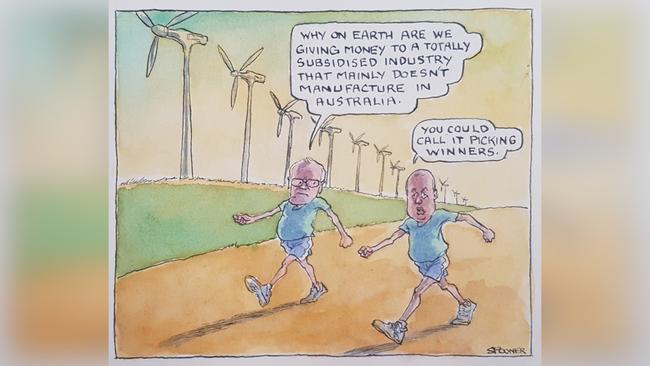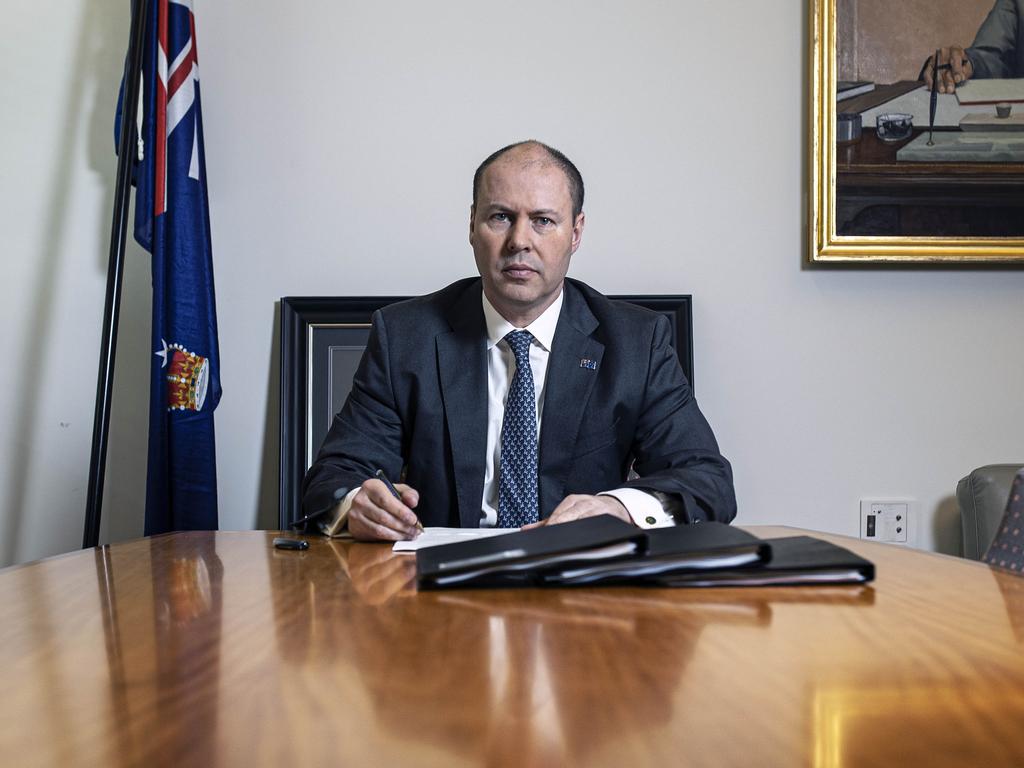
From energy to NBN to the digital economy to the revival of the manufacturing industry, with a slew of tax and other microeconomic reform in between, the carefully spaced announcements have successfully created the image of a government working with real momentum to get the economy moving again.
Brilliant in concept, but now comes the execution.
Debt is the topic de jour, but while the deficit may top $200bn on a debt-to-GDP basis it will come out around 35 per cent, compared to 120 per cent after WWII.
Since 1971 there have been just eight years with no net debt (gross debt minus interest-bearing assets) and no year with no gross debt.
The point being we shouldn’t get too concerned about a post-pandemic budget in deficit.
The latest speculation about kickstarting the economy comes with a revival of a short-lived Gillard government invention — a loss carry-back tax provision aimed at boosting businesses that were profitable before but now losing money due to COVID.
The concept was first raised publicly by PwC boss Tom Seymour in an interview on September 4.
The idea has gained traction after being introduced in New Zealand earlier this year. It works as an extension of JobKeeper-type benefits but only rewards companies that are profitable.
It was dropped in Australia because of administrative difficulties in the wake of the debate over the failed mining tax.
The tax change is being considered along with the BCA’s long-sought investment tax, which is seen as better than a cut in company taxes because it would benefit local and not foreign companies. The BCA dream would be to have both.
Seymour said reintroduction of the 2012 company tax carry-back provisions would help revive the economy and boost jobs.
The concept is rather than carrying losses forward in future years, companies want the cash now, so they could claim this year’s losses against last year’s profits and taxes.
The previous scheme in Australia had a $1m limit on the carry-back over two years. Checks could be imposed, such as having continued ownership as measured by shareholder levels, franking credits, past tax payments and other restrictions to avoid avoidance.
The advantage of the scheme is it benefits companies that were profitable in the past but were hit like everyone else by the COVID recession.
It would put cash in their pockets immediately, rather than having to try to survive and claim tax credits later.
PwC’s Seymour said from the government’s perspective the tax take would be a timing issue: instead of a drop in tax receipts next year the fall would come from last year’s receipts, which could be covered with borrowings.
Intractable insolvency
But headaches still loom on the insolvency front.
By way of example, consider a suburban shopping strip where two coffee shops are in COVID-related financial problems. They can’t pay the $1000 a week rent charged but can maybe pay $500 under government-imposed restrictions on in-house dining.
The landlord has a problem because she has borrowed from the bank based on earning $2000 a week, not the $1000 a week that the tenants now want to pay.
This is an issue which will play big next year when the handouts and bank loan deferrals stop.
The best solution is always private agreement: the landlord decides she wants the two businesses to continue so they come to an agreement on lower rentals.
If one or more of the three file for voluntary administration it can get tricky.
If the administrator keeps the businesses running then the coffee shops are liable for rent and the administrator is in turn liable for whatever terms are agreed by the court; in this case, based on the recent PAS Group ruling the rent is a business expense which must be met before the administrator takes his or her cut.
If the shopping strip owner can’t meet the bank obligations then there is an issue with the bank which must then consider whether the returns will be better by liquidating the shopping strip or trying to keep it running as a growing business.
The hope is to do the latter, and just to settle claims the court should be able to include COVID as an external factor to take into account in considering an administration.
Rio’s Aussie team
In the three weeks since Rio showed JS Jacques the door it has engaged UK-based MWM to lead the search on a replacement and for board succession.
Simon Axworthy has come in to help Mark Davies in the key fields of communities and social performance, inheriting some of the heritage responsibilities from departing Simone Niven.
Axworthy studied at UWA before joining Bain and worked with Azure Consulting in Perth before joining Rio two years ago.
New iron ore boss, the Queensland-born 17-year Rio veteran Ivan Vella, has appointed Richard Cohen to take his old job at supply chain services for iron ore.
Cohen comes from the energy and minerals team but started as a graduate in Dampier and spent 17 years on the ground in the Pilbara.
The leadership has strong Australian credentials.
All in the timing
For someone who spent his school holidays working on the family vineyard in Griffith, Frank Calabria has become something of a zealot for customer relations management.
The $500m investment in UK-based Octopus earlier this year was one leg of the platform, but since then Origin retail boss Jon Briskin has rolled out Spike, which was developed with US-based OhmConnect.
Spike is a loyalty scheme in which smart meter owners are invited by SMS or email to participate in energy challenges around cutting usage during peak hours by doing little things like not running their dishwasher during the allotted hours.
That way you save money on your electricity bill and Origin will reward you with cash payments up to $250 a year for those who manage the program well.
It‘s all part of the data collection process. The more you beat past use the more reward points you earn.
There are now just 15,000 of Origin’s 4.2 million customers using Spike but it‘s being rolled out nationally.
It‘s also about customers getting smarter as they are in Queensland, where 44 per cent of homes use solar, followed by 43 per cent in South Australia, 28 per cent in NSW and 26 per cent in Victoria.
The Octopus investment is an upgrade of back office systems to incorporate the Kraken software which allows customer service operators to become energy specialists rather than just gas or electricity and serve a distinct group of 50,000 customers.
That way there is a one in 10 chance you will speak to the same person next time you ring. Origin and that person or the one next door will know all about your home and energy needs.








Prime Minister Scott Morrison didn’t earn the nickname “Scotty from Marketing” for nothing — the run-up to next week’s federal budget has been a command performance showcasing a government working overtime to get the economy going.